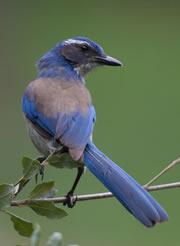 Scrub-jays are the first animals found to plan for the future - besides humans.Ray Wilson / Alamy
Scrub-jays are the first animals found to plan for the future - besides humans.Ray Wilson / AlamyThey might not pay into savings accounts or keep diaries, but western scrub-jays (Aphelocoma californica) can anticipate and plan for the future, research published in Nature this week shows1.
What the birds do in the evening depends on how they might feel the next morning. They can anticipate, for example, how much food, and of what type, will be available in different locations, and store away the right amount, in the right place, for breakfast.
Wild scrub-jays store acorns to sustain them over the winter. Nicola Clayton and her colleagues at the University of Cambridge, UK, exploited this behaviour to test the birds' planning abilities in the lab.
“There's been a bias against birds because they have small brains.”
Thomas Zentall, University of Kentucky, Lexington.
The birds were put in cages that were divided into three parts. In the evening they were kept in the middle section, and fed powdered pine nuts that they couldn't store. In the morning, they were kept either in the 'breakfast room', where they were given food, or went hungry in the 'no-breakfast room'.
After getting used to this set-up, the jays were given whole pine nuts in the evening, which they could bury in trays of sand. The jays put three times as many in the no-breakfast room than in the breakfast room, so that they wouldn't go hungry in the morning.
In another experiment, the jays got breakfast in both rooms. However, their breakfast comprised whole peanuts in one room, and dried dog food in the other. When given both foods in the evening, the birds stored each food in the room where it would be lacking the next morning.
Planning ahead
No other animals outside humans have been shown able to plan actions based on how they will feel in the future, says Clayton. "The jays constantly surprise me," she says. "They keep doing all these clever things."
Jays also seem to be able to imagine others' mental states. In 2001, Clayton's group showed that jays that have stolen food from others are more careful about hiding their own food2. We shouldn't assume, says Clayton, that such mental skills will be confined to our close relatives, such as chimpanzees.
ADVERTISEMENT
Others agree that the cognitive abilities of birds may be under-rated. "It's not a surprise to me," says Thomas Zentall of the University of Kentucky in Lexington, who studies cognition in animals. "There's been a bias against birds because they have small brains."
The bias is misplaced, he argues. Many birds lead intellectually demanding lives — finding and processing different types of food, remembering where they hid food and keeping track of their neighbours. And, Clayton points out, scrub-jays actually have relatively large brains: "Their brains are bigger than chimps, relative to their body size."
Visit our lookahead.html">newsblog to read and post comments about this story.
